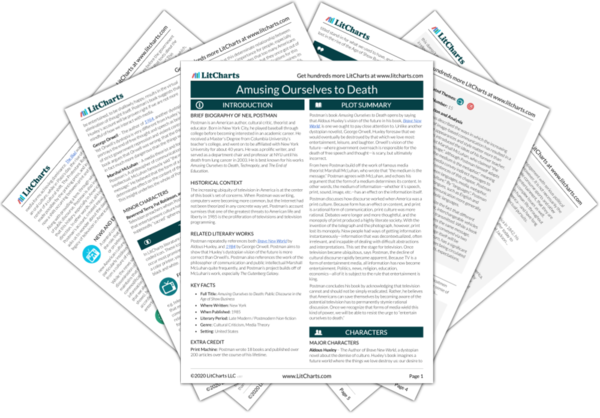Much of Postman’s text—which was written in 1985—involves working towards a kind of prediction or projection of an imagined future. As contemporary, 21st century readers, we must then ask ourselves which parts of Postman’s argument resonate with our present reality, and which parts ring false given advances in technology. These questions are central to the thematic content of book—and though Postman cannot know the answers, his text certainly asks them as well.
Postman’s entire text is framed by the disagreement between the work of George Orwell’s 1984 and Aldous Huxley’s Brave New World. Orwell’s novel imagines a world where government repression is responsible for the loss of life, love, and freedom in a hypothetical dystopian future. Brave New World, meanwhile, imagines that people’s desire for shallow entertainment and technology, rather than government repression, will bring about the demise of culture as we know it. Postman supposes that Huxley’s account of the future will be proven more “right” than Orwell’s. In other words, Postman believes that entertainment will bring down culture before the government does. This gesture acknowledges the fact that texts about the future will eventually be proven “right” or “wrong.” This conclusion must also then apply to Postman’s own text, which, though not a fictional literary dystopia, also makes claims about where we, as a culture, are headed. From the start, then, Postman situates his text as the property of imagined future readers, and he acknowledges that his arguments will eventually be proven “right” or “wrong” when the future actually unfolds.
Forty years have now passed since the publication of Postman’s investigation of media and technology and their effects on culture. As “future readers,” we are thus in a position to evaluate how “right” or “wrong” Postman’s predictions were. For example, Postman acknowledges the ascendancy of computers, but maintains that everything we know about computers comes from television. Naturally the Internet, though not even in existence at the time of this book’s composition, now hangs over the text in a way that demands our attention as a new kind of media and public discourse. This is indicative of a larger demand placed upon the reader of a text like this: to investigate how it maps onto the present state of media technologies in America.
Postman’s text interacts with the “future” (which includes our present moment) in ways that Postman could not have foreseen, and this is true of perhaps all works of “Media Theory,” which became popular in the mid-20th century. Nevertheless, contemporary readers of this text are—and should be—compelled to wonder how Postman’s text holds up today—particularly as television remains as ubiquitous as ever, and the Internet has come to form an entirely new kind of public discourse.
Progress, Prediction, and the Unforeseen Future ThemeTracker

Progress, Prediction, and the Unforeseen Future Quotes in Amusing Ourselves to Death
This book is about the possibility that Huxley, not Orwell, was right.
Like the fish who survive a toxic river and the boatmen who sail on it, there still dwell among us those whose sense of things is largely influenced by older and clearer waters…
The only communication event that could produce such collective attention in today's America is the Superbowl.
Had Irving Berlin changed one word in the title of his celebrated song [There’s No Business like Show Business], he would have been as prophetic, albeit more terse, as Aldous Huxley. He need only have written, There's No Business But Show Business.
Americans are the best entertained and quite likely the least well-informed people in the Western world.
The television commercial is not at all about the character of products to be consumed. It is about the character of the consumers of products.
Brave New World was not that they were laughing instead of thinking, but that they did not know what they were laughing about and why they had stopped thinking.
















